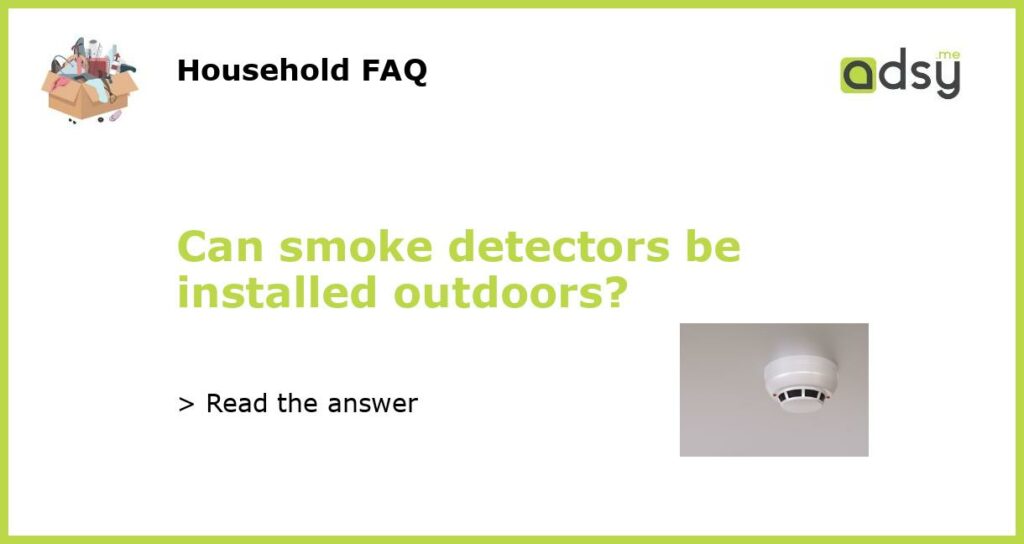Can smoke detectors be installed outdoors?
Smoke detectors are an essential safety device used to detect the presence of smoke and alert individuals of a potential fire hazard. Although typically installed indoors, smoke detectors can also be installed outdoors in certain situations. In this article, we will explore the various considerations and guidelines for installing smoke detectors outdoors.
Why install smoke detectors outdoors?
While smoke detectors are primarily installed indoors to protect occupants inside a building, there are situations where outdoor installations are necessary. Outdoor smoke detectors are typically used to detect fires in open spaces such as parking lots, loading docks, or recreational areas. These installations are commonly found in commercial or industrial settings where a fire could have severe consequences.
Considerations for outdoor smoke detector installation
When it comes to outdoor smoke detector installations, there are a few important considerations to keep in mind:
- Weather resistance: Outdoor smoke detectors need to be able to withstand the elements. They should be designed to resist moisture, extreme temperatures, and other environmental factors.
- Proper placement: It is crucial to place outdoor smoke detectors in areas where smoke can easily reach the detector. Consider factors such as wind direction and proximity to potential fire sources when determining the placement.
- Potential false alarms: Outdoor smoke detectors are more likely to trigger false alarms due to environmental conditions such as dust, pollen, or exhaust fumes. Therefore, it is important to select detectors that have advanced features to minimize false alarms.
- Regular maintenance: Outdoor smoke detectors require regular maintenance to ensure optimal functionality. This includes regular testing, inspections, and cleaning to avoid any potential issues that could compromise their effectiveness.
Types of outdoor smoke detectors
There are different types of smoke detectors that can be used for outdoor installations, including:
1. Ionization smoke detectors
Ionization smoke detectors are commonly used in outdoor settings due to their ability to detect fast-flaming fires. These detectors use a small radioactive source to ionize air inside the detection chamber. If smoke particles enter the chamber, they disrupt the ionization process, triggering the alarm.
2. Photoelectric smoke detectors
Photoelectric smoke detectors are another option for outdoor installations. These detectors use a light source and a photosensitive sensor to detect smoke particles. When smoke enters the detection chamber, it scatters the light, triggering the alarm.
3. Aspirating smoke detectors
Aspirating smoke detectors, also known as air sampling detectors, are highly sensitive and capable of detecting smoke particles at very early stages. These detectors draw air from the environment and analyze it for the presence of smoke particles. They are often used in critical environments where early detection is essential.
Codes and regulations for outdoor smoke detector installation
Before installing outdoor smoke detectors, it is important to familiarize yourself with relevant building codes and regulations in your area. These codes may dictate specific requirements for outdoor smoke detector installations, including placement, type of detectors, and maintenance.
Consulting with a professional fire protection company or your local fire department can provide valuable insights and guidance on complying with regulations and ensuring the proper installation of outdoor smoke detectors.
In summary
While smoke detectors are typically installed indoors, they can also be installed outdoors in specific situations. Outdoor smoke detectors are used to detect fires in open areas and are common in commercial or industrial settings. Considerations include weather resistance, proper placement, potential false alarms, and regular maintenance. Different types of smoke detectors, such as ionization, photoelectric, and aspirating detectors, can be used for outdoor installations. Compliance with building codes and regulations is crucial when installing outdoor smoke detectors, and consulting with professionals is recommended to ensure proper installation and adherence to regulations.






